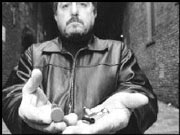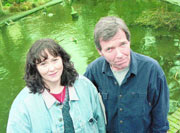WHEN DRUG DEALERS move in next door, Frank LaChance comes to the rescue. After knocking off work in the afternoon, the 53-year-old engineering technician fills the rest of his day staking out crack houses across the city to gather evidence for police. He patrols apartment buildings late at night to thwart drug deals. He’s been threatened at gunpoint and nearly run down with a car. And he won’t accept a dime for his services.
LaChance is a godsend to landlords, but he may become a big pain in the ass for Pike Place Market. LaChance’s group Neighbors Against Drugs, which counts just under a half-dozen souls as members, is now trying to rid the Market area of the trade in pipes and other paraphernalia associated with drug use. LaChance says that the Pike Place Market Association should be ashamed of itself for allowing such sales right in the heart of the city’s most famous landmark. So far, the campaign is a lonely one, but LaChance says the law is on his side.
Last week LaChance made one of his many recent visits to the Market, handing clerks and vendors copies of the state statute that outlaws the sale of crack pipes, marijuana bongs, scales, vials, and other drug-related accessories. At least two Market stores and a stall vendor prominently display such wares, and surrounding smoke shops carry similar merchandise. All post disclaimers saying the items are intended for use with tobacco only, a common way that retailers avoid prosecution. But LaChance says everyone knows what they’re for and that the charade stinks. He’s convinced that store owners can be persuaded to close out their inventories if citizens call their bluff.
LaChance, who with his splay feet and recessed chin looks like a guy who played tuba in his high-school marching band, employs polite conversational tactics rather than rants. If a store owner isn’t available to talk with him, he quietly leaves. But LaChance will be back.
Pike Place Market Association officials say LaChance is picking on longtime, respected businesses that aren’t to blame for the area’s problems with drug dealing. Store owners say what they do is perfectly legal. A clerk at Pharaoh’s Treasures, located on the lower level of the Market, says he doubts his boss would agree to stop selling pipes because they’re popular items. “If it’s illegal, they wouldn’t have a whole store upstairs that specializes in pipes,” he says, referring to the Pipe Palace overhead.
Seattle City Council member Jim Compton recently gave LaChance five minutes on the phone to air his complaints. But Compton aide Linda Robson says that while her boss supports LaChance’s crusade, the council member is not going to pursue it unless the community makes some noise.
Given the bulldog tenacity LaChance has shown in the past, however, Market vendors and city officials had best not count him out. LaChance has taken on a lot of challenges since organizing a Rainier Beach neighborhood to oust a drug den in 1987, and he knows the power of persistence. While dining at a friend’s restaurant located downtown off Second Avenue last year, LaChance watched as a procession of people whistled up at an apartment window above the restaurant and caught parcels that were tossed down. He talked to the apartment manager and was soon spending evenings in an empty unit across from the suspected drug hangout spying on the hallway traffic through the door’s peephole. When the manager had trouble evicting the tenant for not paying rent, LaChance caught him sneaking in late one night and served him the papers. “God bless him,” says the apartment manager, who asked that neither her name nor her building be mentioned. “He’s been like an angel to me.”
Downtown community associations may not yet know who Frank LaChance is, but they soon will. Gary Howse, president of the Downtown Seattle Residents Council, says he’s eager to meet with LaChance. “It sounds like his goals and ours are the same,” says Howse. And not every smoke shop owner around Pike Place Market sports a worried frown when LaChance visits. At Pikes Smoke Shop, on Second, Munir Ahmad smiles and shakes LaChance’s hand. Ahmad, an older man from India in a button-down collar and sweater, says he’s tired of the drug activity on his street and has agreed not to order any more of the pipes and bongs that bring in twice the revenue Ahmad makes selling tobacco. Then Ahmad motions LaChance closer and whispers. “That girl knows you,” he says, referring to a woman on the other side of the shop. “She was going to buy a pipe, but when she saw you, she said, ‘No, I don’t need that.'” LaChance looks. Indeed, the two have met. The woman had been living with the man LaChance helped evict last year.








